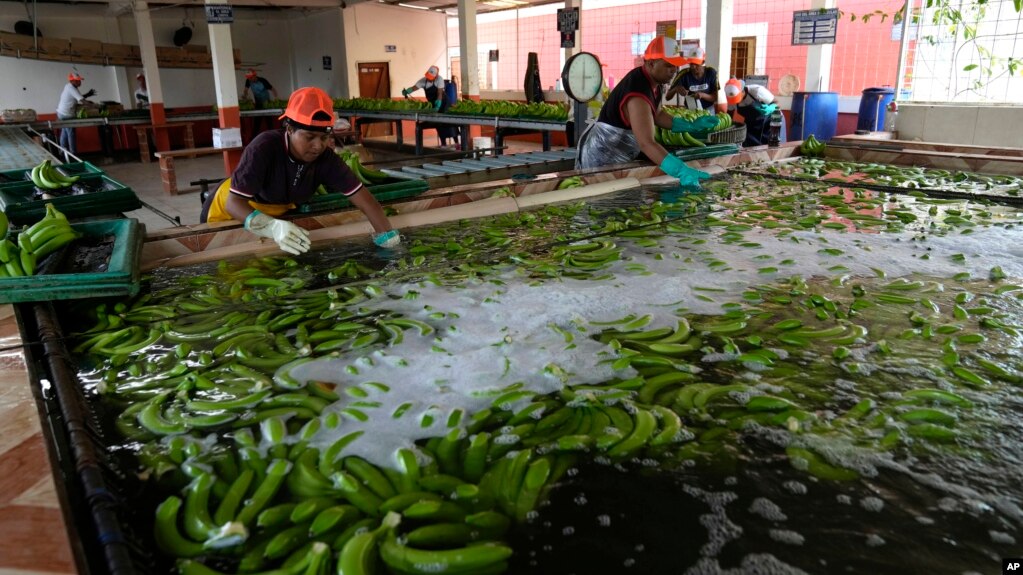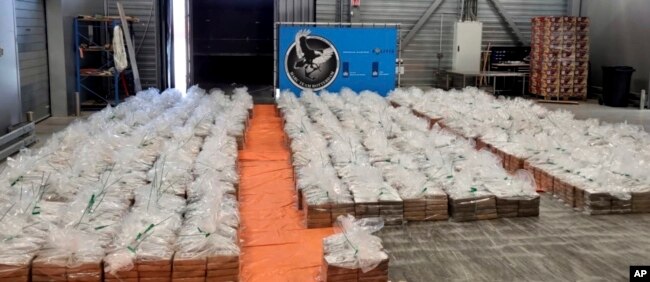Drug Traffickers Use Banana Industry in Ecuador for Shipping

Ecuador is increasingly at the meeting point of two worldwide trades: bananas and cocaine.
The South American country is the world's largest exporter of bananas with about 6.5 million metric tons a year. Its neighbors, Peru and Colombia, are the world’s largest cocaine producers.
Drug traffickers find containers filled with bananas the perfect vehicle to smuggle their product.
Drug trafficking has since brought extreme violence across this once-peaceful nation. Shootings, murders, kidnappings and extortions have become part of daily life. That is especially true in the Pacific port city and banana-shipping center of Guayaquil.
The country was shocked when Fernando Villavicencio, a presidential candidate known for his tough position on organized crime, was shot to death on August 9. He had accused the Ecuadorian Los Choneros criminal group and its imprisoned leader of threatening him and his campaign team days before the killing.
In addition to being close to cocaine production, drug smugglers from Mexico, Colombia and the Balkans in Europe have also set up operations in Ecuador. That is because the country uses the U.S. dollar; its laws and institutions are weak; and criminal groups like Los Choneros are ready to work.
A record 2,304 metric tons of cocaine was produced in 2021 around the world, mostly in Colombia, Peru and Bolivia. That year, nearly a third of the cocaine seized by officials in Western and Central Europe came from Ecuador, two times the amount reported in 2018, found a United Nations report.
Large drug seizures have become more common within the past month. European officials have made record-setting seizures after inspecting containers carrying bananas from Ecuador.
Officials on August 25 announced Spain’s biggest cocaine seizure yet: 9.5 metric tons hidden among boxes of bananas from Ecuador in a refrigerated container. Dutch officials also made their country’s largest-ever cocaine seizure last month — nearly 8 metric tons — in a container of Ecuadorian bananas. Officials in Greece and Italy also announced seizures of cocaine hidden in Ecuadorian bananas this year.
Knowingly or not, banana growers, exporters, shipping companies, port operators, private security companies, customs agents, agriculture officials, police, and buyers can be used by drug traffickers.
Some traffickers have created false companies to look like real banana exporters. Others have taken control of legal businesses, including plantations. They have found companies willing to cooperate in trafficking. They have also paid off, threatened or kidnapped truck drivers and other workers to help get cocaine into shipments.

FILE - This file picture provided on Aug. 10, 2023 by the Rotterdam Public Prosecution Service shows 8,000 kilograms (17,637 pounds) of cocaine in Rotterdam, Netherlands. (Openbaar Ministerie, Netherlands Public Prosecution Service via AP, File)
Violent deaths in Ecuador have doubled from 2021 to 2022, when 4,600 died, the most ever recorded in a year. The country is likely to break the yearly record again, with 3,568 violent deaths recorded in the first half of 2023. In Guayaquil, people live in fear.
No more than 30 percent of containers are currently inspected at Ecuadorian ports. President Guillermo Lasso’s government says it wants to use scanners on entire containers. Twelve of those machines were supposed to be operating already but that has not happened yet, said National Police General Pablo Ramírez. He is Ecuador’s national director of anti-drug investigations.
Jose Hidalgo is director of the Association of Banana Exporters of Ecuador. He said the industry is more vulnerable to trafficking than other export products because of the number of containers that it uses.
He explained that exporters spend about $100 million yearly on security measures. That includes surveillance cameras at plantations, GPS monitoring of trucks, and the identification of land routes that require police patrols to keep criminals away.
Still, some exporters have been accused of being involved in trafficking cocaine. The organization behind the cocaine seizure in Spain operated through a banana exporting company in Machala, a city south of Guayaquil.
After this story was published in The Associated Press, agriculture and customs officials in Ecuador announced in a statement that they had removed a government-run banana export database. It removed information on export companies considered to be false or incomplete. It also canceled permits of plantations covering 16,000 hectares found to be nonexistent.
___________________________________________________
Words in This Story
smuggle — v. to move from one country into another illegally and secretly
extort — v. to get from a person by the use of force or threats
institution — n. an established organization
refrigerate — adj. to put or keep in a refrigerator in order to make it cold or keep it fresh
customs — n. an action or way of behaving that is usual and traditional among the people in a particular group or place
scanner — n. a device that reads or copies information or images into a computer
vulnerable — adj. easily hurt or harmed physically, mentally, or emotionally
surveillance — n. the act of carefully watching someone or something especially in order to prevent or detect a crime
monitor — v. a device that is used for showing, watching, or listening to something
https://learningenglish.voanews.com/a/drug-traffickers-use-banana-industry-in-ecuador-for-shipping/7258885.html